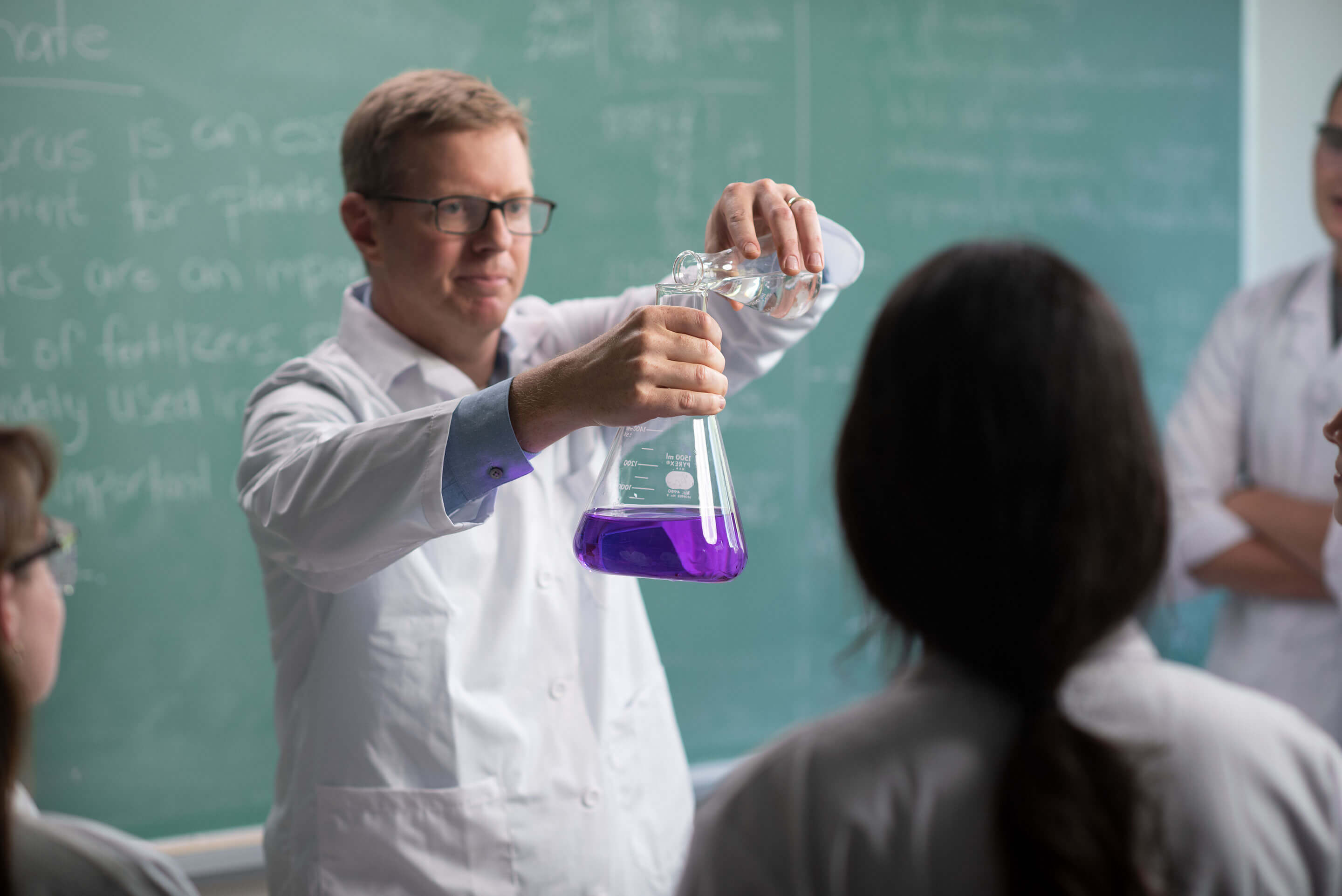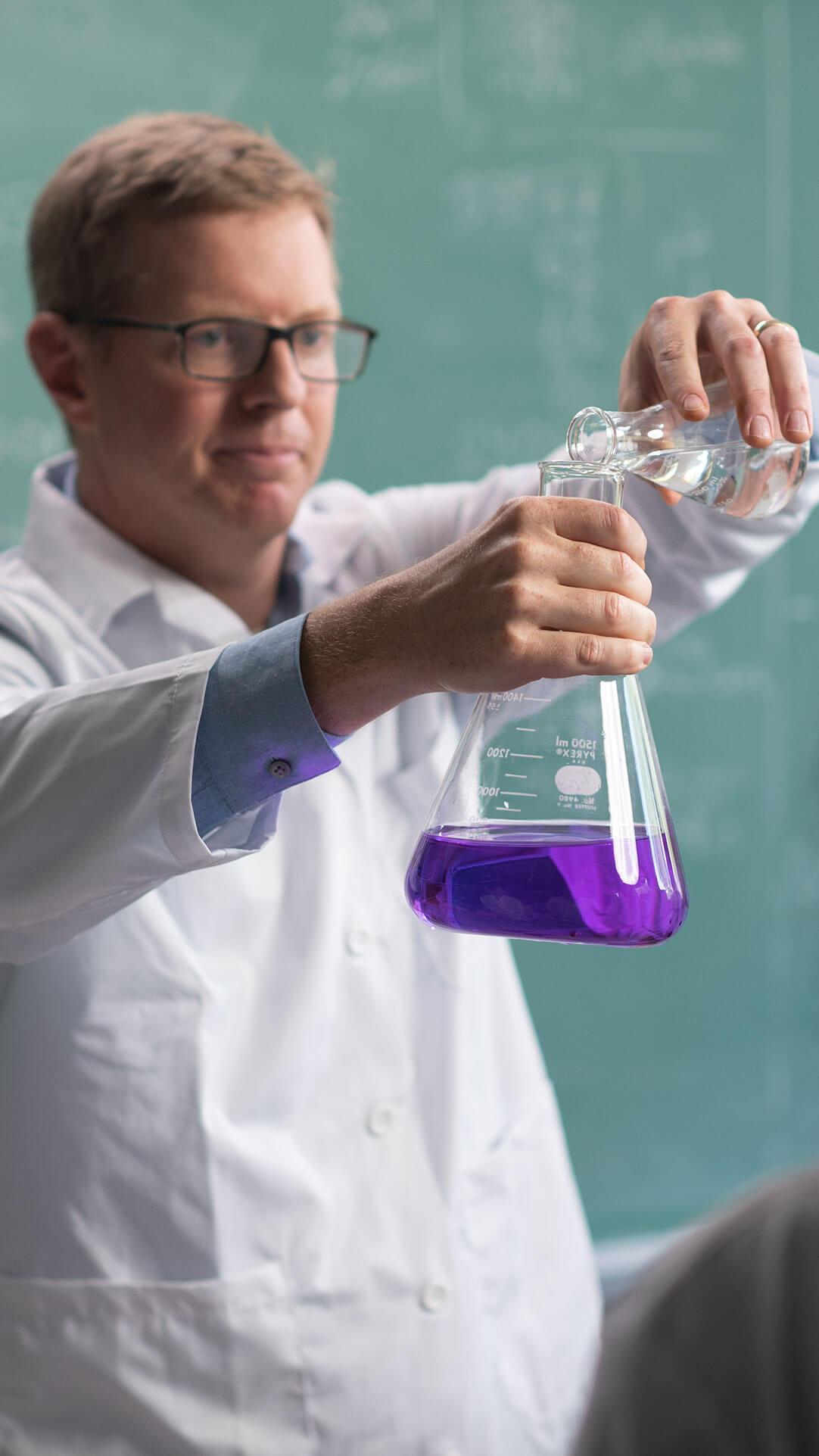Biochemistry Courses
Honours Major: Biochemistry (18 courses)
- BIO-121, 122, 242; 261; 351;
- One of BIO-445 or 467;
- CHE-121, 122, 221, 222, 231, 341, 351, 361, 462, 463;
- CHE-381/382/383/384
- One of CHE-480 or 490
Cognate Requirements:
Note:
- A mathematics or environmental studies minor is recommended for the Biochemistry honours major to ensure all course requirements can be completed in a four-year program.
Course Details
Fundamentals of Biology I BIO-121
This course focuses on the molecular and cellular processes in living organisms. Topics covered in lecture and laboratory include: the structure and function of biomolecules, cell membranes, organelles, and cells; genetic replication and expression; cell cycle; and energy metabolism. Includes a weekly three-hour lab. Materials fee applies.
Prerequisites:
Grade 12 U Biology or permission of the department
Corequisites:
CHE-121
Fundamentals of Biology II BIO-122
This course explores the broad branches of the tree of life and how organisms interact with each other and with the environment. The structure and function of representative species of bacteria, protists, fungi, plants, and animals are examined in lecture and laboratory. Phylogeny and the theory of evolution are covered and discussed within a Christian framework. Includes a weekly three-hour lab. Materials fee applies.
Prerequisites:
BIO-121or permission of the instructor
Corequisites:
CHE-122or permission of the instructor
Cell and Molecular Biology BIO-242
A study of the structure and function of cells as the fundamental building units of living organisms. Topics include, but are not restricted to the molecular constituents of cells, major cell organelles, endo/exocytosis, intracellular signaling, cell growth and metabolism, and special cell functions. Methods of investigation will be examined throughout the course and the development of hypotheses and theories will be placed in a historical and contemporary context. Includes a weekly three-hour lab. Materials fee applies.
Prerequisites:
BIO-122,
CHE-121
Genetics BIO-261
Discussion of the organization, replication, transmission, expression, and evolution of genetic materials. The course is organized around the levels of genes, chromosomes, organisms and populations. Topics include the expression, control and mutation of genes; the molecular organization and information coding; replication, repair, transmission and mutation of chromosomes; the relation between genes, genotype, phenotype and environment; and the genetic structure and variability of populations, including selection and speciation. Throughout the course methods of investigation will be explained. The structure and operation of genetics as a science will also receive attention. Includes a weekly three-hour lab. Materials fee applies.
Prerequisites:
BIO-122,
CHE-121
Microbiology BIO-351
An introductory course which provides an understanding of microbial structure and biochemistry and includes practical experience in the handling and maintenance of microbial cultures. Topics include the classification and identification of microorganisms, the role of micro-organisms in health and disease, and the application of microbial processes in industry. Includes a weekly three-hour lab. Materials fee applies.
Prerequisites:
BIO-242
Toxicology BIO-445
Toxicology is the field of study which seeks to understand the adverse effects of toxic substances (chemical, physical, and/or biological) to living organisms. Fundamental concepts will be addressed such as dose-response relationships, mechanism of uptake, transport, distribution and storage of xenobiotics, detoxification and depuration, target organ toxicity and physiological consequences (e.g. teratogenesis,
mutagenesis, carcinogenesis), and risk assessment techniques. Includes a weekly three-hour lab. Materials fee applies.
Prerequisites:
BIO-242 or 261
Principles of Chemistry I CHE-121
An introduction to the major principles of chemistry that explain the reactions of elements and their compounds. Topics include the structure of matter, states of matter, ideal gases, stoichiometry, the chemistry of water, energy changes of chemical reactions, atomic orbitals and electron configurations, the periodic table, chemical bonding and models to predict the shapes of molecules. Includes a weekly three-hour lab. Materials fee applies.
Prerequisites:
Grade 12 U Chemistry
Principles of Chemistry II CHE-122
A continuation of CHE-121. Topics include reaction kinetics, chemical equilibrium, strong and weak acids and bases, solubility products, electrochemistry, the direction of chemical change, and an introduction to organic chemistry. Includes a weekly three hour lab. Materials fee applies.
Prerequisites:
CHE-121
Organic Chemistry I CHE-221
An introduction to organic chemistry. Topics include representations and nomenclature of organic molecules, resonance, hybrid orbitals and covalent bonding in organic molecules, Lewis acids and bases, conformations, stereochemistry, reaction mechanisms, substitution and elimination reactions, reactions of alkenes, retrosynthesis strategies, gas chromatography, NMR, and infrared spectroscopy. Includes a weekly three-hour lab. Materials fee applies.
Prerequisites:
CHE-122
Organic Chemistry II CHE-222
A continuation of CHE-221. Topics include Grignard reactions, synthesis and reactions of alkynes, alcohols, ethers, aromatics, aldehydes, ketones, carboxylic acids, and amines, with an emphasis on the application of organic chemistry to the pharmaceutical industry. Includes a weekly three-hour lab. Materials fee applies.
Prerequisites:
CHE-221
Analytical Chemistry CHE-331
An introduction to analytical chemistry. Topics include statistics, proper handling of lab equipment, calibration of analytical instrumentation, equilibrium chemistry, gravimetric and titrimetric methods, UV/visible spectrophotometry, atomic emission and absorption spectrophotometry, gas chromatography, and high- performance liquid chromatography. Includes a weekly three-hour lab. Materials fee applies.
Prerequisites:
CHE-122
Inorganic Chemistry CHE-341
A study of the periodic trends in the properties of elements and their compounds. Topics include ions in aqueous systems and solids, coordination chemistry, oxidation and reduction reactions, transition metal complexes, atomic and molecular orbital theory, symmetry, materials chemistry, and bioinorganic chemistry. Includes a bi-weekly three-hour lab. Materials fee applies.
Prerequisites:
CHE-122
Physical Chemistry CHE-351
A study of the underlying physical principles that govern changes in energy and entropy and explain many important phenomena in chemistry and biochemistry. Topics include the laws of thermodynamics, free energy, chemical equilibrium, activities and ionic strength, chemistry and biochemical kinetics, and diffusion. Includes a bi-weekly three-hour lab. Materials fee applies.
Prerequisites:
CHE-122, MAT-121
Recommended: MAT-122,
PHY-122
Biochemistry I: Structures and Functions of Biomolecules CHE-361
An introduction to the structure, function and analysis of the major classes of biomolecules found in living organisms: proteins, carbohydrates, lipids and nucleic acids. Includes an introduction to the structure and function of enzymes. Includes a weekly three-hour lab. Materials fee applies.
Prerequisites:
CHE-221Recommended:
BIO-242,
CHE-222
Senior Seminar I CHE-381
These courses consist of a weekly one-hour seminar that explores the contexts for the disciplines of chemistry and environmental science, including historical, theological, ethical, societal, and vocational dimensions. The seminars will also equip students to carry out scientific research in the fields of chemistry and environmental science.
(0.75 credits each)
Prerequisites:
Year 3 or 4 standing in the Biochemistry or Chemistry major
Senior Seminar II CHE-382
These courses consist of a weekly one-hour seminar that explores the contexts for the disciplines of chemistry and environmental science, including historical, theological, ethical, societal, and vocational dimensions. The seminars will also equip students to carry out scientific research in the fields of chemistry and environmental science.
(0.75 credits each)
Prerequisites:
Year 3 or 4 standing in the Biochemistry or Chemistry major
Senior Seminar III CHE-383
These courses consist of a weekly one-hour seminar that explores the contexts for the disciplines of chemistry and environmental science, including historical, theological, ethical, societal, and vocational dimensions. The seminars will also equip students to carry out scientific research in the fields of chemistry and environmental science.
(0.75 credits each)
Prerequisites:
Year 3 or 4 standing in the Biochemistry or Chemistry major
Senior Seminar IV CHE-384
These courses consist of a weekly one-hour seminar that explores the contexts for the disciplines of chemistry and environmental science, including historical, theological, ethical, societal, and vocational dimensions. The seminars will also equip students to carry out scientific research in the fields of chemistry and environmental science.
(0.75 credits each)
Prerequisites:
Year 3 or 4 standing in the Biochemistry or Chemistry major
Biochemistry II: Enzymes and Metabolism CHE-462
An investigation of the kinetics and regulation of enzyme catalyzed reactions, the principles of metabolism, and the central metabolic pathways, including glycolysis, gluconeogenesis, the pentose phosphate pathway, the citric acid cycle, the electronic transport chain, fatty acid metabolism, and amino acid metabolism. Includes a weekly three-hour lab. Materials fee applies.
Prerequisites:
CHE-361
Advanced Techniques in Biochemistry & Molecular Biology CHE-463
This course will provide students with an immersion into the world of molecular biology research. Students will investigate unique research questions within a team based laboratory setting. Throughout the course, students will gain experience with project and experimental design, various laboratory techniques, data analysis and interpretation, as well as the honing of oral and written communication skills.
This course is particularly intended for students interested in graduate studies, or careers in the research field. Includes a weekly three-hour lab. Materials fee applies.
Prerequisites:
BIO-261,
BIO-351,
BIO-361Recommended: HSC-342
Internship CHE-480
A one-term training experience in an area of chemistry or biochemistry. The purpose of the internship is to provide students with on-the-job experience, to help students in making career decisions, and to prepare students for post-graduate education and/or employment opportunities. See page 61 of the Academic Calendar for information on internships.
Prerequisites:
Year 4 standing
Independent Research Project CHE-490
A one-term undergraduate research project in chemistry or biochemistry. Students will
plan, carry out, analyze, interpret, and present results of a faculty-approved research
project. For more information on setting up an independent research project see page 61 of the Academic Calendar. Materials fee applies.
Prerequisites:
Year 4 standing in the Biochemistry or Chemistry major
History & Philosophy of Science SCI-310
An introduction to key topics in the history and philosophy of Western science. The course explores how scientific ideas (in the past and now) are situated historically and culturally, are informed by worldviews, and shape worldviews.
Prerequisites:
Year 3 or 4 standing
Physics I: Newtonian Mechanics PHY-121
An introductory, calculus-based study of the physical world. The course covers mechanics and other selected topics. Includes a weekly lab. Materials fee applies.
Prerequisites:
Grade 12 U Calculus
Corequisites:
MAT-121
Physics II: Waves, Heat and Time PHY-122
A continuation of PHY-121, this course covers selected topics in wave motion, thermodynamics, optics, and modern physics. Includes a weekly lab. Materials fee applies.
Prerequisites:
PHY-121
Corequisites:
MAT-122



